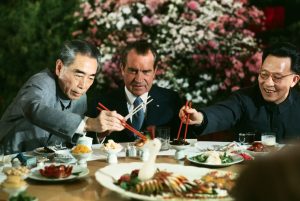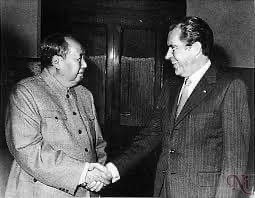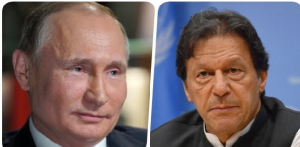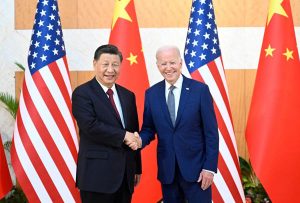# -China in all fairness demands that the US-China relations be governed as per the agreement struck in between the two countries in Shanghai in the year 1972.
# -President Nixon and Chinese Prime Minister Premier Zhou En-Lai had entered into an agreement, later known as the Shanghai Communique- a document that had charted both individual and common interests, and had articulated a “One-China” policy.
# -“The United States stands ready to do just that — work with you — if that’s what you desire,” Biden said in Bali.
# “For Moscow, Islamabad is equally important as is New Delhi”, is what Kudashev bluntly said.
# The new Army Chief Asim Munir, if he so desires, can act as a “broker of peace or stabilizer” in between the conflicting political parties in Pakistan including the party headed by Imran Khan.
# -After the Ukraine crisis, Russia and China wanted to solidify their bonds for understandable political reasons.
# -Pakistan can play its diplomatic cards under its sleeves in a way that neither it annoys the US nor the Russians.
##################################
N. P. Upadhyaya (Aryal)
Kathmandu: Senior political analysts in South Asia had predicted much in advance that the emergence of liberal democratic leader in the USA as President, Joe Biden will definitely prefer reconciliation over confrontation with China.
China-US conflict impacts South Asia and the otherwise as well.
However, contrary to the expectations worldwide, in the initial period confrontation prevailed.
After a long drawn affray with China on Taiwan over Nancy Pelosi’s visit, the US and China ties had touched a new low and then an exchange of fiery war of words commenced which had almost alarmed the world population for some time.
Nancy Pelosi was in Taiwan on August 02, 2022.
To recall, Beijing considers Taiwan part of its own territory which has no right or whatsoever to conduct foreign relations.
If Taiwan is a defector for Beijing then on the contrary Taiwan takes itself absolutely as an independent and a sovereign nation which enjoys, primarily, excellent ties with the US-the lone superpower.
By the way, Taiwan is also a major buyer of the US weapons which is what appears to have annoyed China to a greater extent.
The US has so far remained undeterred and continues to back the Taiwanese government despite the disliking of the Chinese side.
Nixon accepts One China Policy:

China in all fairness demands that the US-China relations be governed as per the agreement struck in between the two countries in Shanghai in the year 1972.
It was in this year that the US President, Richard Nixon, had taken a daring step by making a “calculated” trip to China in order to normalize and then expand its ties with an estranged country-China.
Nixon was assisted then by the US top diplomat, Henry Kissinger.
The respective teams led by President Nixon and Chinese Prime Minister Premier Zhou En-Lai had entered into an agreement, later known as the Shanghai Communique- a document that had charted both individual and common interests, and had articulated a “One-China” policy.
Since then in ‘paper’ the US adhered to one China policy but kept teasing China in its desired way with special focus on Taiwan and on Tibetan issues.
Tibet is taken as the underbelly of mainland China.

It was President Nixon’s 1972 China visit that had regulated the US-China relations and the US in effect had agreed to abide by “One China” policy since then.
However, the excessive hobnob of the US with Taiwan in the years that followed after the issuance of the Shanghai communique were the main political reasons that had distanced China from the US.
Nancy Pelosi’s travel to Taiwan apparently compelled China to inch towards the Russian Federation and with the Ukraine crisis (invasion?), Russia too clearly exhibited a visible tilt towards China to “show its strength”. In doing so, both China and Russia were guided by their prime national interests.
It was perhaps “balancing acts” for both China and Russia in their own calculations and definitions.
The balancing race and Pakistan:
And it was this undeclared China-Russia alliance that in more ways than one brought Pakistan into picture for a variety of issues in South Asia’s regional politics.
Because of China’s advanced ties with Pakistan through the China-Pakistan Economic Corridor (CPEC), the Russian Federation too had no hesitation in the changed context in forging cordial ties with a Pakistan which had already inched closer to Russia from the time of the Shanghai Cooperation organization meet in Bishkek, Kyrgyzstan ( June 14, 2019).
Pakistan stood with the US during entire Cold War era.
It was the meet in Bishkek that Prime Minister Imran Khan and the Russian President Vladimir Putin had forged a new bond with each other which made then the Russian foreign minister to drop in Islamabad straight from Delhi.

For Putin, PM Modi was a bad boy because it was in the US designed Quad club.
Speaking candidly, the Russian envoy in Delhi, Nikolai Kudashev had already hinted to Delhi that Islamabad too was a reliable friend of Moscow.
It was the first salvo to Delhi from Delhi based Moscow’s envoy.
“For Moscow, Islamabad is equally important as is New Delhi”, is what Kudashev bluntly said.
This was a direct hint to Delhi from Moscow that the latter is not happy with Delhi for its changing of the camp-from the USSR to the US.
This at least decreased the Indian hegemony in South Asia.
Vladimir Putin came closer to Pakistan as its traditional ally in South Asia- as India had changed the camp and gone into the fold of the US designed security mechanism-the QUAD.
Putin took it as an affront.
For Putin Pakistan was a compelling choice for South Asia in order to send signals to India that if you change the camp then we now have an equally competent and recognized regional force in South Asia that is Pakistan.
Putin’s changed stance elevated the ranks of Pakistan in South Asia instantly.
And in doing so, Russia in many more ways than one enhanced Pakistan’s prestige in the comity of nations and more so in South Asia’s regional politics. It recognized Pakistan as a stabilizing regional force in South Asia.
However, Pakistan has yet to recognize its potential and capabilities in South Asia. This is unfortunate as Pakistan’s diplomatic activities in South Asia appears nil after the ouster of Imran Khan which needs to be corrected.
The China-Russia undeclared alliance clearly annoyed the US in its own way and the latter was thus forced to invent some instrument in order once again to normalize its stressed ties with China because with Pelosi’s visit to Taiwan, the US-China ties had come to a nadir.
The Taiwani envoy’s presence:
Needless to say, the Taiwani issue at regular intervals brings both China and the US face to face much to the annoyance of the peace-loving global population.
To recall, that Taiwan is very near and dear to the US administration came to light for the first time when the Taiwani envoy to Washington, Hsiao Bi-khim, attended Biden’s swearing-in ceremony in January 2021.
Her presence at the inaugural occasion made it almost clear that the US is likely to provoke China with all its strength come what may.
For Taipei’s part, the invitation and the subsequent presence of the Taiwanese envoy was a “significant breakthrough” in relations with Washington, Taiwan’s official Central News Agency quoted an unnamed inside source as saying.
However, despite the strained ties following the Taiwan trip of Pelosi, the US had cleverly kept the line of communications open with China and the same was once again reiterated by the “liberal US President” Joe Biden while meeting the Chinese President Xi Jinping in Bali, Indonesia, November 14, 2024.
Seasoned analysts claim that the presence of the Taiwani Ambassador at Biden’s inaugural ceremony was perhaps a deliberate act of the US to read China’s mood as to how it reacts to the USs move.
Chao Deng and Chun Han Wong wrote for the Wall Street Journal, dated January 21, 2021, that when asked about the Taiwan envoy’s presence at the ceremony, China’s foreign ministry spokeswoman, Ms. Hua Chunying reiterated Beijing’s longstanding opposition to official interactions between the U.S. and Taiwan but stopped short of condemning the U.S. gesture as provocative.
China in effect took a fairly peacemaking stance on its ties with the US. In other words, China avoided challenging the US over the Ambassador’s attendance in Washington at the time of Biden’s swearing in ceremony.
This does mean that the Chinese side wanted to take some time to read President Joe Biden’s inner motives on Taiwan prior to it exploding on the US over Taiwan’s envoy’s presence at the important US event.
Apparently encouraged by China’s non-action on the presence of Ambassador Hsiao Bi-khim at President Biden’s inaugural/swearing-in ceremony, prompted the US Speaker Nancy Pelosi to make a sudden but yet daring dash to Taiwan, August 2022.
Some sources in Washington said that the Biden administration was not in favor of Nancy Pelosi’s visit to Taiwan as it was sure to further bring in troubles to the already strained US and China ties.
However, other sources claim that Nancy’s visit to Taiwan was all but a planned affair but portrayed as if the visit was Pelosi’s own discretion which had nothing to do with the Biden administration.
This time China reacted with full force and the US-China ties instantly took a different turn and touched its lowest ebb with the commencement of the exchange of verbal war of words in between the two recognized and competent political rivals-the US and China.
The Bali meet and US-China ties: 
However, wisdom appears to have triumphed on both the confronting sides, both the US and China, while meeting in Bali, Indonesia for the G20 Summit, November 14, 2022, have reconciled with each other and apparently vowed not to flare up the political differences on some “key” international issues in the days ahead for the good of the world peace.
Biden even said to the newly elected Chinese President Xi Jinping that, “Let’s forget the past” and China’s strongman responded positively.
Biden must have concluded that since the entire Chinese strength is with Russia, it would not be advisable for him to further tease China.
Needless to say, China and Russia are on the same page and conclude that World politics can’t run under the whims of the USA.
After the Ukraine crisis, Russia and China wanted to solidify their bonds for understandable political reasons.
Both Russia and China converge in saying that both wish to defend the international system with the United Nations at its core.
“We’re going to compete vigorously, but I’m not looking for conflict,” Mr. Biden said at a news conference after the meeting.
“I’m looking to manage this competition responsibly.”
In response, President Xi said, “As the leaders of these two great powers, China and the United States, we must play the role of setting the direction of the rudder, and we should find the correct approach for developing bilateral relations.”
This should mean that the US and China have once again agreed not to treat each other as conflicting rivals but instead take each other as healthy “competitors”.
With this patch, should this mean that the US henceforth will abandon teasing China on Taiwan, Tibet and other several issues where the two big powers differ sharply?
All in all, President Biden in a subtle manner has accepted that the US shall benefit if and when it keeps warm relations with China.
“The United States stands ready to do just that — work with you — if that’s what you desire,” Biden said.
Isn’t it enough to believe that Joe Biden talked peace with China?
Wait! Wait! Wait!
President Xi responded by saying, “history is the best textbook, so we should take history as a mirror and let it guide the future,” Xi said.
And China too has felt in Bali, Indonesia, that “confrontation” must be replaced by “reconciliation”.
Our early predictions have come true.
Unhappy India may create problems:
The fresh US-China détente perhaps shall distance India from the US and chances are fair that India will inch even more closer to Russia.
India can tolerate anything but not China. The US-China “peace” is sure to impact India in a negative manner. India must have felt cornered by the US.
It is this Indian political shift in South Asia that shall allow Pakistan to come closer with the US in addition with China and the Russian Federation.
As China is already an “iron” friend of Pakistan and thus it is time that Pakistan must extract political benefits from the “alignments” and realignments” that is taking shape every now and then.
Alignments and realignments of smaller countries shall continue for some time as US-China détente has far reaching impacts and its ensuing political consequences both in South Asia and the world at large.
In politics there are neither permanent enemies nor friends.
Countries only wish to secure their national interests.
However, Pakistan must not annoy Russia as the new Russia-India friendship is all but the Ukraine factor as India has been soft on Russia over Ukraine.
Pakistan can play its diplomatic cards under its sleeves in a way that neither it annoys the US nor the Russians.
Unavoidable Pakistan factor:
The twist seen in US-China ties after the G20 meet in Bali has surely awarded “enough” space to regional powers like Pakistan for political maneuvering in order to establish itself as a genuine regional force in South Asia-a fitting match to hegemon India.
But how? Let it be decided by foreign policy veterans of Pakistan and the new Army Chief, Lt. General Asim Munir (former spy master) who by this time must have taken up his most authoritative seat.
How smart, speaking in diplomatic terms, is the new Army Chief shall be watched carefully in entire South Asia.
New Army Asim Munir chief must begin touring South Asia at the earliest. It will send positive signals here and there. It will concurrently decrease Indian hegemony in this part of the world.
Needless to say, the Pakistan Army Chief is a dominant political force that presumably commands the national politics and external relations.
How Munir plays a role in striking a balance between China, the US, and Russia shall have to be watched.
In addition, the new Army Chief Asim Munir, if he so desires, can act as a “broker of peace or stabilizer” in between the conflicting political parties in Pakistan including the party headed by Imran Khan.
But will he?
The Indian factor too will test his (Munir’s) political acumen indeed.
But politics keeps on changing and so the alignments and realignments. So let’s keep our fingers crossed.
Yet we trust President Biden who has said in Bali that, “I absolutely believe there need not be a new Cold War”.
Let’s hope that the US sticks to its commitments made in Bali and also believe that China too responds to the USs desire in an appropriate manner”.
President Xi’s statement that, “the two countries should take history as a mirror and let it guide the future”.
Hidden in the statement is the desire for peace and a desire to work with the US in the days and years ahead. This is encouraging.
Peace must prevail over conflict, this should be the bottom-line.
The net loss of the US-China long awaited rapprochement will be to expansionist India as India expected to “tease” China with the USs backing has evaporated at least for the time being.
India’s dangerous plans in Nepal:
But India will not settle for less. It is now wounded lion.
India has some treacherous plans for South Asia which warns even the US not to harm Indian interests in areas which were traditionally under Indian sphere of influence.
Barring Pakistan, Indian influence could be seen in smaller countries of the region.
An article authored by Vedanta Choudhary, Avinav Singh Khatri and Sankalpa Chakrabarti in “The National Interest” dated November 16, 2022, clearly states that “India welcomes the USs engagement with Nepal, as long as such dialogue between Kathmandu and Washington either promotes New Delhi’s interests or promotes the interest of either party without causing harm to Delhi’s interests in the region”.
The article further says that with USs increased presence in Kathmandu, China will have twin obstacles of India and US strategically, thereby diverting China’s sole attention from India”.
It is clearly a sponsored article. Nepal clearly is the venue of a big tussle in between the US, China and India. Question is now: Whether China and the US shall stick to the promises made in Bali and avoid “direct confrontation? Keep finger crossed.
The upcoming days for Nepal appear frightening, to say the least if our past experience is any guide. Frankly speaking, to blunt the India’s upcoming ill motives, China, though not a reliable partner of Nepal, must strengthen its influence in South Asia.
That’s all.
